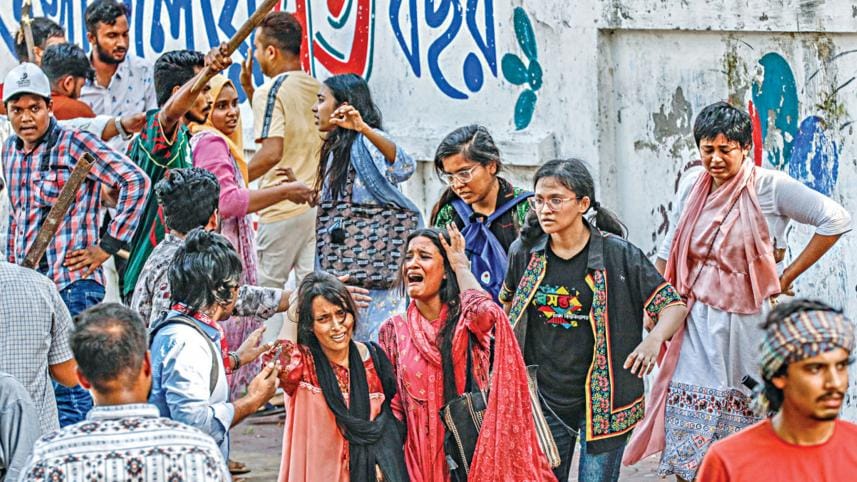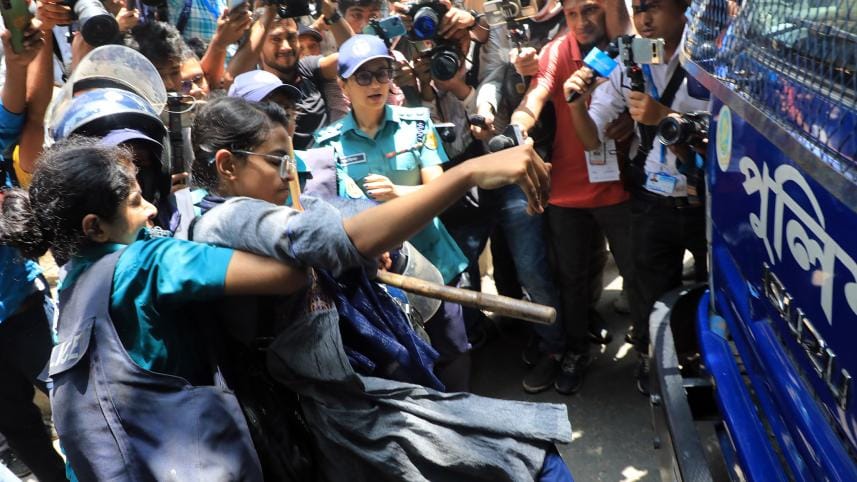July Uprising: State forces, AL perpetrated gender-based violence

The United Nations fact-finding report has exposed disturbing accounts of gender-based violence during the July uprising last year, with women protesters facing physical assaults, rape threats, and arbitrary detention.
Supporters of Awami League, Chhatra League, and state security forces carried out the violence, as per the report released by the UN Human Rights Office (OHCHR) in Geneva.
It alleges these actions were aimed at silencing women's activism during the mass protests.
The report details how female protesters were subjected to assaults specifically designed to humiliate them based on gender.
"Assaults on female protesters often targeted specific body parts such as the face, chest, pelvis, and buttocks. The perpetrators sought not only to inflict pain but also to humiliate and degrade women specifically because of their gender," the report said.
These attacks were often accompanied by gender-based insults, with women being labelled as "whores," "sluts," and "prostitutes".
In one particularly shocking incident in early August in Dhaka, a group of men armed with bamboo sticks apprehended a woman, searched her belongings, and assaulted her after finding a Bangladeshi flag in her bag. They tore her hair, ripped her shirt, and groped her while hurling sexualised insults.
In another case in July, two Chhatra League supporters allegedly threatened to rape a female protester, her mother, and all the women in her family before assaulting her and making sexually explicit remarks.
The report documents multiple instances of violence against female protesters in Dhaka and other cities, including Cumilla, Savar, Sylhet, and Rangpur.
Female students at Dhaka University and Eden Mohila College were among the primary targets. On July 14, Chhatra League supporters poured hot water on female students at Eden Mohila College as they attempted to join protests at DU.
The following day, a group of around 50 BCL supporters, both male and female, attacked women from Eden College as they prepared to protest. One victim was severely beaten and later attacked again while receiving treatment at Dhaka Medical College Hospital.

On August 4, two female journalists, documenting protests in Shahbagh, were threatened with violence by AL supporters, highlighting the dangers faced by those reporting on the unrest.
The report also details the mistreatment of female detainees, particularly at the Detective Branch headquarters on Minto Road.
Five women arrested for attempting to join a protest were beaten with sticks at a police station in Dhaka, resulting in bleeding and severe bruising. One senior officer reportedly took pleasure in beating a woman and instructed others to do the same.
When another woman begged for mercy, a police officer allegedly threatened to kill her by putting a gun in her mouth before beating her.
During block raids, while the majority of those arrested were men, law enforcement began detaining women from July 23 onwards after many men had fled their areas fearing arrest.
AFTERMATH OF THE PROTESTS
After AL fell, the report highlights cases of revenge violence, including sexual assaults, against women from minority religious and indigenous communities.
In one documented case, a woman who supported the previous government was intercepted by two men who insulted her with sexual remarks, grabbed her dress, slapped her, and punched her chest.
A few days later, the same woman was encircled by attackers, who ripped her clothes, groped, and ultimately raped her.
She was later denied healthcare at a hospital due to her political affiliation.
The OHCHR states that the true scale of sexual and gender-based violence during the uprising is likely far greater than what could be documented.
It further notes that while women's formal participation in political decision-making has improved, they continue to face significant gender stereotyping and discrimination in public life.
The report calls for in-depth, gender-sensitive investigations to uncover the full scope of these violations and to provide victims with necessary support. It also recommends that sexual and gender-based violence be a particular focus of further inquiries.
Contacted, Fauzia Moslem, president of Bangladesh Mahila Parishad, said, "The politics that prevails in our country are centred around strengthening political parties by any means. Whenever a party is in power, they engage in a cycle of revenge to consolidate their strength. This has perpetuated a culture of retaliatory politics."
"It [violence against women protesters] has been happening over the past 50 years because we have failed to break free from this culture. This is why we witnessed the same pattern of violence against women during the protests before August 5, and it continues even after August 5."
"To end this cycle, we must move away from this revenge-driven political culture," she added.




 For all latest news, follow The Daily Star's Google News channel.
For all latest news, follow The Daily Star's Google News channel.
Comments